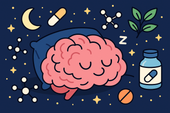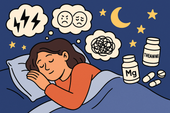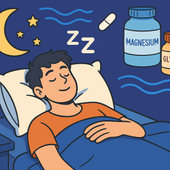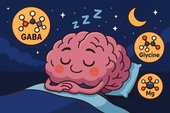Magnesium and Anxiety: Why This Mineral Could Be Your Social Secret Weapon
Introduction
Anxiety is one of the most common mental health challenges in the modern world. While occasional nervousness is normal, many people live with chronic anxiety—especially in social situations. Sweaty palms, racing heart, overthinking every word… sound familiar? 😰
If you’ve ever wondered whether your body might be missing a key ingredient that could help calm your mind, magnesium might be the answer. This mineral doesn’t get nearly enough attention, yet it plays a profound role in brain chemistry, stress response, and nervous system regulation.
Today, we’ll dive deep into the science of magnesium and anxiety, exploring:
🌟 How magnesium affects your brain and body
🌟 Why low magnesium is linked to more stress and worry
🌟 Which forms of magnesium are best for calming social anxiety
🌟 Natural strategies (breathwork, supplements, therapy) to combine with magnesium for long-term relief
Looking for supplements for people with Social Anxiety? Click here.
🌿 Understanding Magnesium: The Unsung Mineral Hero

Magnesium is one of the body’s most essential minerals, yet around 50% of people don’t get enough. It’s involved in more than 300 biochemical reactions, ranging from energy production to protein synthesis. But its biggest impact may be on your nervous system and stress regulation.
Here’s what magnesium does in your brain and body:
✨ Regulates neurotransmitters – helps balance serotonin, dopamine, and GABA, the key brain chemicals for mood and relaxation.
✨ Supports the stress-response system – calms the hypothalamic-pituitary-adrenal (HPA) axis, reducing excess cortisol (the stress hormone).
✨ Stabilizes nervous system activity – acts as a natural “brake” against overexcited neurons, preventing that jittery, restless feeling.
✨ Improves sleep quality – helps regulate melatonin and relaxes muscles, leading to deeper, restorative rest.
When magnesium is low, the nervous system becomes overactive—making you more prone to anxiety, irritability, and sensitivity to stress.
😰 Magnesium Deficiency and Anxiety: What’s the Connection?
Researchers have long observed a connection between magnesium deficiency and increased anxiety. Some studies show that when magnesium levels drop, the brain becomes more vulnerable to stress signals, amplifying feelings of fear and worry.
🔹 The GABA connection: Magnesium helps activate GABA receptors in the brain. GABA (gamma-aminobutyric acid) is the neurotransmitter that tells your brain to “chill out.” Without enough magnesium, GABA activity is weaker, and you may feel restless or anxious.
🔹 Cortisol spikes: Low magnesium can lead to higher cortisol output, leaving you stuck in “fight-or-flight” mode. This is one reason magnesium-deficient people often feel more socially anxious.
🔹 Sleep problems: Poor sleep quality (often caused by low magnesium) worsens anxiety. Lack of restorative rest can trigger a vicious cycle: tired brain = heightened anxiety response.
Real-world takeaway: If you’re constantly feeling on edge, magnesium deficiency might be silently fueling your anxiety.
🧠 Magnesium and the Social Anxiety Brain
Social anxiety isn’t just “being shy.” It’s a heightened fight-or-flight reaction in everyday interactions. Here’s how magnesium may help calm that storm:
🌬️ Regulating the amygdala: The amygdala is the brain’s fear center. Magnesium helps calm its overactivity, reducing exaggerated fear responses.
💡 Supporting neuroplasticity: Magnesium boosts BDNF (Brain-Derived Neurotrophic Factor), which helps your brain adapt and learn new patterns. This is crucial for people trying to “retrain” their brain away from anxious thought loops.
🩺 Reducing physical symptoms: Because magnesium also relaxes muscles and lowers blood pressure, it can reduce the racing heart, shaky hands, and tight chest that often show up during social anxiety.
Imagine walking into a party and feeling your body stay calm, instead of spiraling into panic—that’s the potential power of magnesium.
🌱 Best Forms of Magnesium for Anxiety Relief

Not all magnesium supplements are created equal. Some forms are poorly absorbed or act more like laxatives than brain support. Here are the top science-backed forms for calming anxiety:
🟢 Magnesium Glycinate
Bound to the calming amino acid glycine.
Highly bioavailable, gentle on the stomach.
Excellent for reducing anxiety and improving sleep.
🟣 Magnesium L-Threonate
Specially designed to cross the blood-brain barrier.
Increases magnesium levels in the brain directly.
Shown in studies to improve memory, mood, and reduce anxiety.
🔵 Magnesium Taurate
Combines magnesium with taurine (another calming compound).
Supports both the nervous system and heart health.
Great choice for people with stress-related palpitations.
🟡 Magnesium Citrate
More affordable, decent absorption.
Mild laxative effect, so better for those who also deal with constipation.
🚫 Forms to avoid for anxiety: Magnesium oxide (poor absorption), magnesium sulfate (Epsom salts—better for baths than internal use).
Looking for supplements for people with Social Anxiety? Click here.
🍽️ Natural Sources of Magnesium
Before you reach for a supplement, know that magnesium-rich foods can also help calm your mind:
🥑 Avocados
🥬 Spinach, kale, and other leafy greens
🍌 Bananas
🌰 Almonds, cashews, and pumpkin seeds
🍫 Dark chocolate (70%+)
🫘 Beans and lentils
🐟 Salmon and mackerel
Tip: Pair magnesium-rich foods with vitamin B6 for better absorption and synergy.
🌬️ Breathwork + Magnesium: A Calming Combo
Magnesium helps calm the nervous system, but pairing it with breathwork takes things to the next level. When anxiety spikes, your breath usually becomes shallow and fast—fueling more panic.
Want to try Breathwork? Click Here.
Here are two techniques that work beautifully alongside magnesium:
🌬️ Box Breathing
Inhale for 4 → Hold 4 → Exhale for 4 → Hold 4.
Resets the nervous system and grounds you before a social event.
🌬️ Extended Exhale Breathing
Inhale for 4 → Exhale for 6–8.
Activates the vagus nerve, signaling safety and calm.
By combining magnesium (long-term nervous system support) with breathwork (instant relief), you create a powerful toolkit against social anxiety.
🧑⚕️ The Role of Therapy and Mental Health Support
While magnesium can make a big difference, it’s not a “magic pill.” True healing often comes from addressing the psychological roots of anxiety.
✅ Cognitive Behavioral Therapy (CBT) – helps reframe anxious thought patterns and reduce avoidance behaviors.
✅ Exposure therapy – gradually trains your brain to face social fears in a safe, structured way.
✅ Mindfulness-based therapy – reduces rumination and builds awareness of anxious triggers.
Think of magnesium as the biological foundation (calming your nervous system), while therapy builds the mental resilience to handle real-life situations.
Looking for online therapy for people with Social Anxiety? Click Here.
⚡ Lifestyle Habits That Supercharge Magnesium’s Effects
To get the most out of magnesium, pair it with supportive habits:
☀️ Get sunlight & vitamin D – improves magnesium absorption and mood.
🏋️ Exercise regularly – lowers stress hormones and enhances magnesium uptake.
💧 Stay hydrated – dehydration worsens anxiety and magnesium loss.
❌ Cut back on caffeine & alcohol – both deplete magnesium and overstimulate the nervous system.
🌙 Magnesium for Better Sleep = Less Anxiety

Poor sleep is one of the strongest drivers of social anxiety. Magnesium helps by:
😴 Relaxing tense muscles
🌙 Increasing melatonin production
🧘 Regulating nighttime cortisol
If you struggle with “Sunday night anxiety” before a big work week, taking magnesium glycinate in the evening may improve both sleep and next-day calmness.
🌟 Practical Tips: How to Start Using Magnesium for Anxiety
Start low, go slow – 100–200 mg daily is a good starting point.
Pick the right form – glycinate or threonate for brain support.
Take it consistently – magnesium works best when levels are maintained.
Combine with lifestyle tools – therapy, breathwork, nutrition, and stress management.
💡 Final Thoughts
Magnesium isn’t just a mineral—it’s a social secret weapon. By calming your nervous system, regulating brain chemistry, and supporting restorative sleep, it can make social interactions feel less terrifying and more manageable.
If you’ve been struggling with social anxiety, magnesium might just give your brain the calm foundation it needs—so you can show up as your authentic, confident self. 🌿✨
Looking for supplements for people with Social Anxiety? Click here.
📚 References (Selected Studies & Reviews)
Boyle NB, Lawton C, Dye L. The Effects of Magnesium Supplementation on Subjective Anxiety and Stress—A Systematic Review. Nutrients. 2017.
Kirkland AE, Sarlo GL, Holton KF. The Role of Magnesium in Neurological Disorders. Nutrients. 2018.
Tarleton EK, Littenberg B. Magnesium Intake and Depression in Adults. J Am Board Fam Med. 2015.
Murck H. Magnesium and Affective Disorders. Nutr Neurosci. 2002.
Eby GA, Eby KL. Rapid recovery from major depression using magnesium treatment. Med Hypotheses. 2006.
Related Posts
-

How to Measure Your Emotional Growth Over Time
Emotional growth can’t be measured on a scale — but it can be tracked through awareness, regulation, and reflection. Learn how to monitor your emotional evolution using journaling, biofeedback, and science-backed metrics for real progress. 💫
-

The Connection Between Creativity and Resilience
Creativity and resilience share the same roots — adaptability, flexibility, and imagination. Learn how creative expression rewires your brain for strength, helping you transform stress into growth through neuroscience, art, and self-reflection. 🌿
-

Why Cycling Supplements May Improve Long-Term Resilience
Your body adapts to everything — even supplements. Discover why cycling your supplements helps prevent tolerance, boost energy naturally, and build lasting resilience by aligning with your body’s biological rhythms. 🌿
-

The Role of Biofeedback in Emotional Strength
Learn how biofeedback bridges mind and body — helping you monitor heart rate, breath, and brain activity to build emotional strength, resilience, and calm under pressure. See how science meets mindfulness for lasting control. 🌿
-

How to Stay Strong During Long-Term Stress
Long-term stress doesn’t just drain your energy — it rewires your biology. Discover science-backed ways to strengthen your body, balance your mind, and build lasting resilience through breathwork, nutrition, mindset shifts, and supplements that restore calm and focus. 💪
-

Resilience Training for Entrepreneurs
Entrepreneurship isn’t just about strategy — it’s about stamina. Discover how resilience training helps founders stay calm, clear-headed, and adaptable under pressure through neuroscience-backed habits, emotional regulation, and smart supplementation. 🌿
-

How Nootropics Can Boost Emotional Control
Emotions don’t have to control you. Discover how nootropics like L-theanine, ashwagandha, saffron, and omega-3s help balance brain chemistry, improve focus, and strengthen your ability to stay calm and composed under stress. 🌿
-

Stacking Adaptogens for Maximum Resilience
Adaptogens are nature’s stress shield — helping you stay calm, energized, and clear even under pressure. Learn how to stack herbs like ashwagandha, rhodiola, reishi, and schisandra for maximum resilience, balance, and long-term vitality. 🌿
-

Post-Traumatic Growth and Supplements That Support It
After trauma, true healing means more than survival — it’s transformation. Learn how post-traumatic growth happens in the brain and body, and explore natural supplements like magnesium, ashwagandha, saffron, and omega-3s that support resilience, clarity, and emotional repair.
-

How to Regain Focus After Emotional Stress
After emotional stress, your nervous system feels frayed — your focus fades, thoughts race, and calm seems impossible. Learn how to restore balance, rebuild concentration, and retrain your brain for clarity and peace through evidence-based mind–body tools. 🌿
-

The Future of Sleep Supplements
The future of sleep supplements is here — where science meets nature. Discover how next-generation formulas use adaptogens, amino acids, and biotech innovations to support deep, restorative sleep without dependency. 🌙
-

Emerging Research on Sleep and Nootropics
Can nootropics help you sleep better? Discover how compounds like L-theanine, magnesium threonate, ashwagandha, and Alpha-GPC influence neurotransmitters, circadian rhythm, and brain recovery — bridging the gap between smarter days and deeper nights. 🌙
-

New Herbal Extracts for Deep Sleep
Discover the next generation of herbal extracts for deep sleep — from saffron and magnolia to jujube and lemon balm. Learn how these plant-based compounds calm the nervous system, balance cortisol, and promote truly restorative rest. 🌙
-

Sleep Biohacking: What Works and What Doesn’t
Biohacking your sleep can sound futuristic — from red light therapy to wearables and supplement stacks. But which hacks actually help, and which are just hype? Discover the science-backed sleep strategies that truly improve rest, recovery, and brain health. 🌙
-

Sleep Support for People with Anxiety Disorders
💭 A restless mind can keep you up all night — thoughts spinning, heart racing, and peace feeling far away. Learn how to quiet overthinking, regulate your nervous system, and create a nightly ritual that teaches your brain to let go and rest deeply. 🌙
-

How to Fall Back Asleep After Waking Up
Waking up in the middle of the night? Learn how to fall back asleep quickly and calmly using breathing techniques, stress-reducing rituals, and natural supplements like magnesium and glycine. Restore your body’s rhythm and wake up feeling refreshed.
-

The Role of Omega-3s in Sleep Quality
-

Stacking GABA and Glycine for Deeper Rest
Discover how stacking GABA and glycine can help you achieve deeper, more restorative sleep. Learn how these calming amino acids work together to relax your mind, soothe your body, and improve overall sleep quality—naturally and safely.
-

Overcoming Jet Lag with Supplements
✈️ Jet lag doesn’t have to ruin your trip! Discover how supplements like melatonin, magnesium, L-theanine, and tart cherry can help you reset your body clock faster, reduce fatigue, and recover energy naturally after long flights. 🌙
-

Managing Sleep During Times of Stress
Feeling wired and restless? Learn how to manage sleep during stressful times through nutrition, breathwork, and natural supplements like magnesium and L-theanine. Discover how to calm your nervous system and restore deep, peaceful rest—even when life feels overwhelming.
-

The Role of Magnesium for Night Cramps
Night cramps keeping you awake? Discover how magnesium helps relax muscles, balance electrolytes, and prevent painful spasms. Learn which forms work best, how to take them, and how to pair them with other nutrients for cramp-free, peaceful sleep.
-

Supplements That Reduce Nighttime Awakenings
🌙 Discover science-backed supplements that help you stay asleep through the night. From magnesium and L-theanine to glycine and ashwagandha, learn how these natural compounds calm your nervous system, balance cortisol, and prevent 2 a.m. wake-ups for deeper, more restorative rest.
-

Nootropics That Promote Calm and Rest
Explore the world of calming nootropics — natural brain enhancers that promote relaxation, better focus, and deeper rest. Learn how L-Theanine, magnesium, ashwagandha, and other adaptogens help balance your nervous system, reduce stress, and support restorative sleep.
-

Best Natural Supplement Stack for Sleep
Discover the best natural supplement stack for deep, restorative sleep. Learn how nutrients like magnesium, L-theanine, glycine, and calming herbs such as chamomile and ashwagandha work together to relax your body, calm your mind, and improve sleep quality—naturally and safely.
-

Combining L-Theanine and Magnesium for Sleep: A Calm Night, Naturally
Discover how combining L-Theanine and Magnesium can help you drift into deep, restorative sleep. Learn how this natural duo calms the mind, relaxes the body, and supports your nervous system—without grogginess the next morning.
-

How to Sleep Better After Intense Workouts
Struggling to fall asleep after a tough workout? Learn how to optimize your post-training recovery with nutrition, hydration, and science-backed sleep strategies. Discover how to calm your nervous system, balance hormones, and wake up fully recharged for your next session.
-

Ashwagandha and Valerian: A Bedtime Combo for Deep Rest and Emotional Reset
Discover the calming synergy of Ashwagandha and Valerian root, two natural sleep aids that help quiet the mind, ease anxiety, and promote deeper rest. Learn how this herbal duo supports the nervous system, balances stress hormones, and restores emotional peace — without next-day grogginess.
-

How to Create a Resilience-Boosting Diet
Discover how to build emotional and physical strength from the inside out with a resilience-boosting diet 🍎. Learn which foods stabilize your mood, how supplements like magnesium and omega-3s strengthen your stress response, and why pairing nutrition with breathwork and therapy creates lasting calm, focus, and vitality 🌿💪.
-

Best Teas and Herbal Blends for Calmness: Nature’s Way to Restore Inner Peace
Ashwagandha, the ancient adaptogenic herb, helps your body find balance during stress. Known as “Indian ginseng,” it supports cortisol regulation, boosts energy, and restores calm clarity. Discover how this powerful root promotes resilience, emotional balance, and steady vitality — one cup at a time. 🌸
-

Parenting and Emotional Strength: How to Raise Children Without Losing Yourself
Empathy is the bridge that connects hearts — the quiet power to understand, feel, and support another’s emotions without judgment. Learn how empathy strengthens relationships, enhances communication, and cultivates deeper compassion in everyday life. 🌿
-

How to Bounce Back from Public Failure: Reclaiming Confidence, Purpose, and Power
Visualization is more than imagination — it’s brain training for resilience. By picturing calm, success, or healing, you activate the same neural pathways as real experience. Learn how daily visualization rewires your brain for confidence, emotional balance, and recovery from stress. ✨
-

Coping with Financial Stress Through Resilience: How to Stay Grounded When Money Feels Tight
Body awareness is the foundation of emotional resilience. By tuning into your body’s signals — tension, fatigue, or calm — you learn to recognize stress before it overwhelms you. Discover how mindfulness, gentle movement, and breathwork can deepen your connection with your body and restore balance from the inside out. 🧘
-

How to Stay Positive During Chronic Illness: A Guide to Emotional Strength and Hope
Creativity is more than art — it’s a form of healing. Whether through painting, writing, music, or small acts of expression, creativity helps release emotion, calm the nervous system, and reconnect you to joy. Discover how to use creativity as a tool for emotional balance, resilience, and self-discovery. 🌿
-

Resilience Tips for Caregivers: How to Stay Strong While Caring for Others
Joy isn’t the absence of pain — it’s the quiet strength to find light even in challenging times. Cultivating joy through small daily moments restores balance, releases stress, and reminds you of life’s beauty. Learn how to reconnect with authentic happiness, rebuild emotional energy, and nurture your nervous system through gratitude, presence, and play. 🌿
-

Building Resilience After a Breakup: How to Heal, Rebuild, and Rise Stronger
Social connection is one of the strongest predictors of emotional resilience. During difficult times, genuine relationships act as anchors — calming the nervous system, reducing stress hormones, and helping you regain perspective. Learn how cultivating real human connection can strengthen your mind, heart, and overall well-being. 🌿
-

How to Stay Emotionally Strong During Job Loss
Your emotions are powered by brain chemistry — a delicate balance of neurotransmitters like serotonin, dopamine, and cortisol. When these chemicals work in harmony, you feel calm, focused, and resilient. Learn how daily habits, nutrition, and mindfulness can support your brain chemistry and boost emotional well-being naturally. 🌿
-

The Role of Hormones in Emotional Stability: How Your Chemistry Shapes Your Calm
Hormones shape more than your body — they shape your emotions, resilience, and sense of calm. From cortisol to serotonin, these chemical messengers influence how you react to stress, connect with others, and recover from challenges. Learn how to balance your hormones naturally to build lasting emotional stability and harmony within. 💫
-

Mitochondria and Emotional Energy: The Cellular Power Behind Your Mood
Breathwork is one of the most powerful tools for emotional regulation and cellular balance. Through intentional breathing, you can calm your nervous system, increase oxygen flow to the brain, and even support mitochondrial energy. Learn how conscious breathing connects body and mind — transforming stress into presence and emotional strength. 🌿
-

Inflammation and Its Impact on Mood Resilience: The Silent Link Between Body and Mind
Inflammation doesn’t just affect the body — it impacts the mind. Chronic inflammation alters brain chemistry, depletes serotonin, and makes emotional recovery harder. Learn how calming inflammation through nutrition, mindfulness, and sleep can restore balance, resilience, and a renewed sense of emotional strength. 💫
-

How Antioxidants Protect Emotional Well-being: The Hidden Link Between Oxidative Stress and Mental Health
Antioxidants do more than protect your body — they defend your mind. By neutralizing oxidative stress, antioxidants support serotonin, dopamine, and brain energy pathways that keep you calm, focused, and emotionally balanced. Discover how foods like berries, green tea, and dark chocolate nourish your brain, boost mood, and strengthen resilience from the inside out. 🌿✨
-

The HPA Axis and Emotional Health: The Hidden Bridge Between Stress and Mind
Neuroplasticity — the brain’s ability to rewire and adapt — is the foundation of emotional healing and resilience. When you face stress, trauma, or change, your neural pathways can reshape themselves to support new patterns of calm, focus, and self-awareness. Learn how daily practices like mindfulness, therapy, and breathwork strengthen neuroplasticity to transform emotional pain into personal growth. 🌸
-

Why Cortisol Control Is Key to Resilience: Mastering Stress to Build Emotional Strength
Controlling cortisol — the body’s main stress hormone — is the secret to lasting resilience. When cortisol levels stay balanced, your mind becomes clearer, emotions steadier, and energy more sustainable. Learn how breathwork, mindset shifts, adaptogens, and daily rhythms can help you calm your stress response and build true inner strength. 🌞💪
-

Dopamine’s Influence on Motivation and Recovery: Reigniting Drive and Balance
Healthy relationships are the foundation of emotional balance and resilience. Whether romantic, familial, or platonic, genuine connection releases dopamine, serotonin, and oxytocin — the brain’s “bonding trio” — helping us feel secure, motivated, and seen. Learn how trust, empathy, and communication not only strengthen your connections but also reshape your nervous system for deeper emotional well-being. 🌿🤝
-

The Role of Serotonin in Resilience: How This “Mood Molecule” Shapes Emotional Strength
Serotonin — often called the “resilience molecule” — plays a vital role in how we handle stress, regulate mood, and recover from emotional challenges. Beyond happiness, this powerful neurotransmitter helps balance the gut-brain axis, stabilize the nervous system, and support emotional flexibility. Learn how nutrition, sunlight, mindfulness, and adaptogens can naturally boost serotonin and strengthen your emotional resilience. 🌞🧠
-

How Neuroplasticity Supports Emotional Growth: Rewiring the Brain for Resilience
Neuroplasticity is the brain’s built-in power to grow, adapt, and heal — and it’s the foundation of emotional transformation. Every mindful breath, compassionate act, or reframed thought strengthens new neural pathways that support resilience and self-awareness. Learn how your brain rewires through daily habits, helping you turn emotional challenges into opportunities for growth and calm. 🌿
-

Tai Chi and Adaptogens for Mind-Body Balance: The Art of Harmonizing Energy and Resilience
Alchemy isn’t just an ancient science — it’s a timeless symbol of transformation and inner balance. By blending the physical and spiritual, alchemy teaches us that change begins from within. Just as metals are refined into gold, we too can transmute emotional pain, stress, and chaos into clarity and strength through mindful practice and self-awareness. 🌙✨
-

Cold Therapy and Emotional Control: Training the Mind Through the Body
Cold therapy isn’t just for athletes — it’s a tool for emotional mastery. By exposing your body to controlled cold, you train your nervous system to stay calm under stress, improving focus, mood, and resilience. This article explores the science of cold exposure, its impact on hormones and the vagus nerve, and how ice baths and cold showers can help you build emotional control, one breath at a time. 🧊🧘♂️
-

How Music Influences Emotional Recovery: The Healing Soundtrack of the Mind
Neuroplasticity — the brain’s ability to rewire and heal itself — is at the heart of emotional recovery. Through mindful habits, music, therapy, and consistent mental stimulation, your brain can form new connections that support resilience and well-being. Discover how neuroplasticity turns pain into growth, helping you rebuild balance, focus, and emotional strength. 🌿
-

Nature Therapy for Building Resilience: Reconnecting With the Healing Power of the Earth
Nature therapy helps rebuild emotional resilience by reconnecting you with the healing rhythms of the Earth. From forest walks to sunlight exposure, nature restores balance to your nervous system, lowers stress hormones, and teaches emotional adaptability. Learn how spending time outdoors can enhance mental clarity, calm anxiety, and awaken your natural capacity to heal. 🌞
-

Breathwork Techniques That Pair with Supplements: The Ultimate Synergy for Stress Relief and Mental Clarity
Breathwork and supplements create a powerful mind-body synergy for stress relief, focus, and energy. By combining intentional breathing with adaptogens, nootropics, and calming nutrients, you can naturally regulate cortisol, sharpen mental clarity, and boost emotional balance. This guide explores the best breathwork techniques and supplement pairings to help you feel centered, calm, and energized from the inside out. 🌿


















































